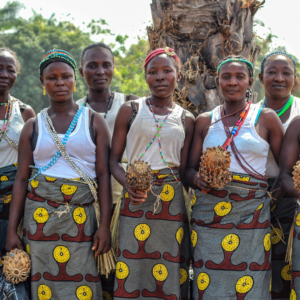Women farmers in Zimbabwe are restoring their livelihoods through a partnership between France, the Food and Agriculture Organization of the United Nations (FAO), World Vision, and the Government of Zimbabwe, working to revive community gardens, improve nutrition, and strengthen resilience to climate shocks.
For more than a decade, women in five villages in Mwenezi had labored to sustain a community garden first established in 2013. Their determination was constantly tested, however, as makeshift fences made from tree branches and logs could not prevent wandering livestock from trampling seedlings and devouring young crops. For many families, the dream of a reliable food source was slipping away. “We would plant, but by the time crops were ready, cattle and goats had already destroyed everything. It was painful, because our children went hungry,” recalled Rumbidzai Mhofu, one of the farmers.
The situation worsened in 2024, when an El Niño-induced drought left already vulnerable families struggling to put food on the table. That is when the Nourish and Thrive Initiative, funded by the Government of France and implemented by FAO with World Vision and the Government of Zimbabwe, stepped in. The partners supported the community in fencing off the 1.6-hectare garden, securing it for 70 families. For the first time in years, women could cultivate without fear of losing their crops. In addition to fencing, families received agricultural vouchers to purchase drought-tolerant and nutritious seeds for horticulture and field crop farming.
The intervention went beyond agricultural inputs. FAO collaborated with government agriculture extension officers to train farmers on crop and pest management, while World Vision and the Ministry of Health provided nutrition education, especially for mothers with children under two years of age. Today, the garden thrives with carrots, onions, tomatoes, a variety of leafy vegetables, butternuts, and green mealies. Farmers who once hesitated to plant due to livestock threats are now planning for year-round harvests. “We are now dreaming of four-star diets. With vegetables from our gardens, our children will eat healthier meals, and we can sell the surplus to pay school fees and even buy livestock,” said Maina Ndhlovu, Chairperson of the Pepukai Community Garden Committee.
The garden has become more than a source of food—it has rekindled dignity and hope. Active participation during the fencing and planting demonstrated the community’s renewed commitment to shaping its own future. The benefits extend beyond nutrition: women are earning income, families can plan for school expenses, and households are beginning to see farming not as a struggle but as an opportunity. “This project gave us back our confidence. For years, we felt forgotten, but today we are proud farmers again,” said one community member.
Challenges remain, particularly around water access. The garden relies on a nearby river, but fetching water is difficult due to the steep slope from the river to the fields. Farmers are appealing for support to establish boreholes or pumps with pipelines to ensure sustainable irrigation.
The project demonstrates the transformative potential of international solidarity combined with local determination. France’s €1 million investment, channelled through FAO and implemented with World Vision and the Government of Zimbabwe, is helping transform lives in some of the country’s most climate-affected districts. As the vegetables grow tall behind sturdy new fences, so too does hope—rooted in resilience, nurtured by partnership, and harvested by communities determined to thrive while nourishing their families and combating poverty, malnutrition, and food insecurity.







